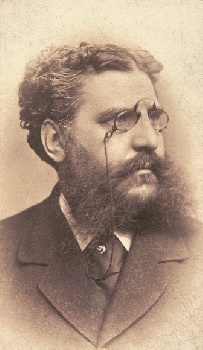| Mihailo Polit-Desančić | |
|---|---|
 | |
| Born | (1833-04-16)April 16, 1833 Novi Sad |
| Died | March 30, 1920(1920-03-30) (aged 86) Timișoara |
| Nationality | Serbian |
Mihailo Polit-Desančić (Serbian Cyrillic: Михаило Полит-Десанчић; 16 April 1833 – 30 March 1920) was a political figure, a journalist and a Serbian writer. He was a member of the Serbian Learned Society (Srpsko učeno društvo) and the Serbian Royal Academy (Srpska kraljevska akademija), predecessors of the current Serbian Academy of Sciences and Arts.
Biography
Mihailo Polit-Desančić was born in Novi Sad, and was an Aromanian or had mixed Aromanian–Serb origins. In Vienna, Polit-Desančić graduated in jurisprudence and obtained another degree in Paris in political science.
Polyglot and scholar, he became a close collaborator of Svetozar Miletić and, with him, one of the most important political figures of the Serbs of Vojvodina of the time, integrated in the possessions of the House of Austria. He then published the periodical Branik, from 1890 the organ of the Serbian Liberal Party in Hungary. He was a member of the parliaments of Croatia and Hungary and a member of Sremski Karlovci's Ecclesiastical and School Council (Crkveno-školski sabor).
After the dissolution of Svetozar Miletić's party, he was a member of the Radical Popular Party (Narodna radikalna stranka) and a member of the People's Liberal Party (Narodna liberalna stranka) and the leader of the liberals of Vojvodina.
He died in Timișoara, and is buried in the Dormition Cemetery in Novi Sad, where his funerary monument is part of a set of 24 tombs of historical, cultural and other personalities inscribed on the list of protected cultural monuments (ID No. SK 1588) of the Republic of Serbia.
Works
Among his works are Verenica Crnogorka (The Montenegrin Bride, 1863), the historical drama Branivoj knez Zahumski (Prince Branivoj of Zahumlje, 1868), the travelogue Putne uspomene (Travels Souvenirs), books of memories like Kako sam svoj vek proveo (How I passed through my century), Uspomene iz 1848–1849 (Memories of 1848–1849), Pokojnici (The Deceased) and four books entitled Besede (Words).
References
- "Mihailo Polit-Desančić". Serbian Academy of Sciences and Arts (in Serbian). Archived from the original on 22 December 2015. Retrieved 12 December 2015.
- ^ Spariosu, Mihai I. (2017). Intercultural Conflict and Harmony in the Central European Borderlands : the Cases of Banat and Transylvania 1849–1939. Vandenhoeck & Ruprecht. p. 159. ISBN 9783847006923. Retrieved 22 December 2019.
- Savin, Miloš (30 June 2020). "Полит о македонском питању" (in Serbian). Cultural Center of Novi Sad.
- "Polit-Desančić, Mihailo". Institut für Neuzeit- und Zeitgeschichtsforschung (in German). 2003. Retrieved 22 December 2019.
- "Dvadeset i četiri nadgrobna spomenika sa grobnim mestima istaknutih političkih, kulturnih i javnih radnika na Uspenskom groblju u Novom Sadu". Cultural Monuments in Serbia (in Serbian). Retrieved 12 December 2015.